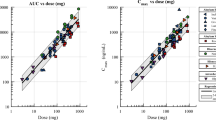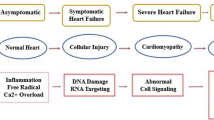Abstract
Purpose: Cyclophosphamide and thioTEPA are frequently used simultaneously in high-dose chemotherapy regimens. During a pharmacokinetic study of 31 courses in 20 patients of cyclophosphamide and its activated metabolite 4-hydroxycyclophosphamide given in the combination cyclophosphamide–thioTEPA–carboplatin, a sharp decrease in 4-hydroxycyclophosphamide concentration was observed immediately after the start of the thioTEPA infusion. A drug-drug interaction was suspected. This putative interaction was investigated in this study. Methods: Possible sequence dependency, due to inhibition of the formation of 4-hydroxycyclophosphamide by thioTEPA, was investigated by altering the sequence of infusion in three patients (four courses) receiving high-dose chemotherapy with cyclophosphamide (1000 or 1500 mg/m2 per day), thioTEPA (80 or 120 mg/m2 per day) and carboplatin (265 or 400 mg/m2 per day) in short infusions for four consecutive days. The pharmacokinetics of cyclophosphamide and 4-hydroxycyclophosphamide were established. Possible inhibition of the metabolism of cyclophosphamide and thioTEPA was investigated in human microsomes. Results: A striking sequence dependency of the pharmacokinetics of 4-hydroxycyclophosphamide was observed. Administration of thioTEPA 1 h prior to cyclophosphamide resulted in decreased Cmax (−62%) and AUC (−26%) values of 4-hydroxycyclophosphamide compared to those of thioTEPA administered 1 h after cyclophosphamide. In human microsomes an inhibition of the conversion of cyclophosphamide to 4-hydroxycyclophosphamide by thioTEPA was observed at clinically relevant concentrations with an IC50 of 23 μM. No inhibition of the formation of TEPA by cyclophosphamide was observed. Conclusions: ThioTEPA strongly inhibits the bioactivation of cyclophosphamide and this may decrease both efficacy and toxicity. Our results seriously question the practice of the simultaneous continuous infusion of cyclophosphamide and thioTEPA and suggest that the sequencing and scheduling of these two agents in high-dose chemotherapy regimens may be of critical importance.
Similar content being viewed by others
Author information
Authors and Affiliations
Additional information
Received: 31 January 2000 / Accepted: 10 April 2000
Rights and permissions
About this article
Cite this article
Huitema, A., Kerbusch, T., Tibben, M. et al. Reduction of cyclophosphamide bioactivation by thioTEPA: critical sequence-dependency in high-dose chemotherapy regimens. Cancer Chemother Pharmacol 46, 119–127 (2000). https://doi.org/10.1007/s002800000132
Issue Date:
DOI: https://doi.org/10.1007/s002800000132




